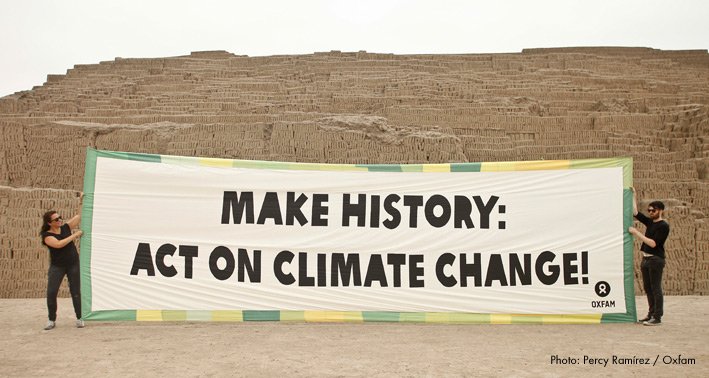2015 World Climate Summit in Paris: Striving for a Follow-Up to the Kyoto Protocol

For years, the world’s heads of state and government have been striving for a new regulation to follow up the Kyoto Protocol—so far without success. However, time is of the essence. If the states do not finally agree on binding targets at the upcoming climate conference in Paris and also implement these targets consistently, global warming will continue to intensify. It’s time to set the course—for a global economy that largely manages without fossil fuels.
To understand what will be at stake in Paris in just under three months′ time, you have to take a look back at the recent history of climate protection diplomacy. We are currently in the ‟post-Kyoto phase″ (2013 to 2020) since so far the world’s heads of state and government have not managed to agree upon a truly new climate treaty following the expiration of the Kyoto Protocol in 2012.
At the World Climate Summit in Doha in 2012, the almost 200 participating countries agreed only that by 2015 they would negotiate a new climate treaty that would not come into force until 2020, however, and that would apply to all of the states. Even back then, this was just a compromise to ensure that the summit in the desert state of Qatar was not a complete failure.
Continuous loop of obstacles and compromises
Essentially, it is a question of finding a new regulation to follow up the 1997 treaty known as the Kyoto Protocol. The Kyoto Protocol, which did not come into force until 2005 as a result of several obstacles, is the only global climate protection agreement to date that sets binding specifications for emissions of greenhouse gases.
The most important aspect was that the industrialized countries should reduce their emissions by a total of 5.2 percent by 2012 in comparison to their level from 1990. This was based on the overriding goal of limiting the rise in temperature since the start of industrialization to two degrees Celsius.
“Blogging Out the Background”—The Two-Degree Goal
Global warming of two degrees Celsius is considered to be a critical level. If the global average temperature rises by more than this, then the effects of climate change on people and the environment are likely to be uncontrollable, according to many scientists. The global climate before the start of the Industrial Revolution is seen as the benchmark here. Since the mid-eighteenth century, the global average temperature has already risen by around 0.7 °C.
Source: pik-potsdam.de, Potsdam Institute for Climate Impact Research
However, the protocol was by no means a guarantee that all of the signatories would actually make a decisive contribution to climate protection. It was ratified by more than 190 countries, but the emissions targets only applied to a total of 37 industrialized countries.
For example, the U.S.—the world’s second biggest emitter of CO2—did not ratify the protocol at all, meaning that it will never implement it at national level. Not even U.S. President Barack Obama, who promised more climate protection in his first election campaign in 2008, has been able to change this.
Violations are not the exception but the rule
In addition, many states failed to meet the targets they had set for themselves. For example, Austria was supposed to reduce its emissions by 13 percent by 2012 under the terms of the Kyoto Protocol, but the latest figures from the Environment Agency Austria show an increase of 5.9 percent. As a consequence, the Alpine country had to purchase pollution certificates totaling around €600 million from other states.
But you would be wrong to imagine that such payments always represent an effective sanction mechanism. This is shown clearly by the example of Canada. In 2011, the country announced that it would withdraw from the agreements of the Kyoto Protocol. The countries that were still committed to the Kyoto Protocol at the time Canada pulled out emitted only around 15 percent of global greenhouse gases. The protocol did not include the U.S. or China, the two countries with the highest emissions of greenhouse gases, and therefore it could not work—this was the official explanation given at the time by Canada’s Minister of the Environment, Peter Kent.
But it’s also true that Canada would have had to pay billions in financial penalties for failing to meet its climate targets. By withdrawing from the treaty, the country avoided having to purchase pollution rights of around 14 billion dollars (then equivalent to around €10 billion).
Big words must finally be matched by big deeds
Canada’s withdrawal is just one example of the low level of acceptance of the Kyoto Protocol, which was once seen as a milestone in the fight against climate change. China and the U.S., which between them are responsible for almost 50 percent of the world’s CO2 emissions, are still continuing to avoid obligations — despite having taken a first step in the right direction with their bilateral agreement at the end of 2014. Russia and Japan remain critical of the current renegotiations and have so far refused to accept any new targets.
“Blogging out the background”—Symbols instead of sanctions
Australia, Belgium, Ireland, Iceland, Greece, Portugal, and Austria were presented with the dubious award of “Fossil of the Day” by the Climate Action Network (CAN), a global network of more than 900 environmental organizations from over 100 countries, for their role in obstructing and blocking progress in the climate protection negotiations during the 2014 Climate Change Conference in Lima (Peru). As the symbolic negative award shows: Serious sanction mechanisms? No chance.
Source: climatenetwork.org
The EU Commissioner for Climate Action and Energy Miguel Arias Cañete recently called the UN Climate Summit in Paris at the end of the year a ‟historic milestone” and a ‟unique opportunity” to create a global economy that is almost entirely independent of fossil fuels. We can only hope that these big words will now finally be matched by big deeds.

Feel free to contribute!